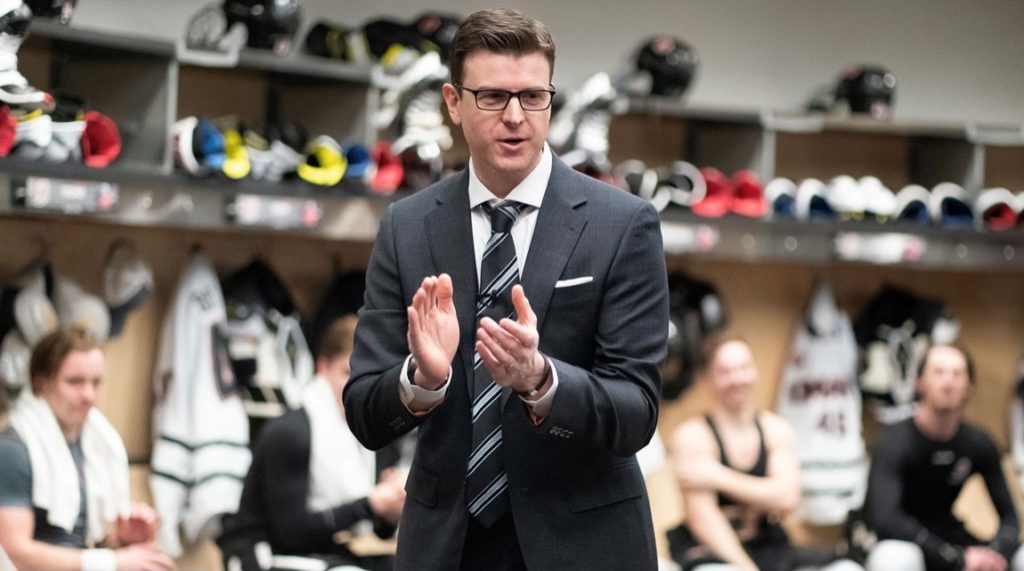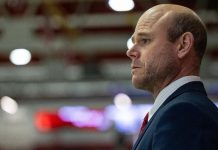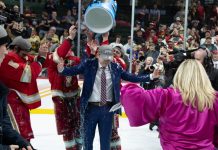
With Omaha having three consecutive series moved due to positive COVID-19 tests, contact tracing and quarantining within the UNO program, many might see Mavericks coach Mike Gabinet as being in an unenviable situation these days.
Certainly, the UNO alum never envisioned something like this global pandemic coming during his playing days. The same positive mindset he had then is still there, though, and although the Mavericks haven’t played in nearly a month, Gabinet is working to make sure his team’s morale stays high in a trying time.
Omaha’s Baxter Arena recently hosted a three-week pod that saw all eight NCHC teams start the regular season there, but UNO’s first post-pod series — scheduled to take place at home Dec. 31 and Jan. 1 against North Dakota — was moved to Jan. 29-30.
A continuing combination of positive tests, contract tracing and quarantining of individuals within UNO’s program led to another series against the Fighting Hawks — set for last weekend in Grand Forks, N.D. — moved to Feb. 19-20. UND faced Colorado College on the road last Sunday and Monday instead.
UNO is still scheduled to visit those same CC Tigers later shortly, but not quite as originally scheduled. Whereas the teams would’ve normally played this Friday and Saturday in Colorado Springs, the series will take place next Monday and Tuesday, Jan. 18-19.
“We had a really clean bill of health, COVID-wise, for a couple months even leading up to the pod, so I know we had very, very few cases in our program,” Gabinet said. “I was getting a little nervous for after the pod, just because when you haven’t had very many cases or few cases before, you know you’re susceptible to getting something in the second half (of the season), and that’s something we knew could happen just because we haven’t had a lot of issues for quite a few months leading up to the pod.
“It’s always in the back of your mind that it could happen, but you can’t avoid what you can’t control. I know some teams had a tougher time before the pod, a couple months before that, and then you’re in that window that you’re probably not testing as many athletes after that.
“We knew we didn’t have a lot of guys that had been exposed to it yet,” Gabinet continued. “You do everything you can to prevent it, and our guys were being responsible and being safe, but as we’re seeing, sometimes there’s no rhyme or reason to getting it.”
A native of Edmonton, Alberta, Gabinet stayed in Omaha during UNO’s recent holiday break.
“There was no pinpoint event or anything that happened that triggered anything,” Gabinet said of individuals in UNO’s program testing positive. “It’s just one of those fluky things where you can’t really explain where it came from or how it got into our program, but it happened.
“I don’t blame a guy going home or things like that. (COVID-19) is just out there, and unfortunately it found its way into our program.”
Since then, the Mavericks have faced a challenge of trying to get their team not just healthy, but in game shape. On Monday, they finished a team practice with three defensemen, one goaltender and seven forwards on the ice. They began the practice with more players than just those 11, although some could only skate for limited windows while following protocols.
“We’re slowly allowed back on the ice now,” Gabinet said. “We’d been off for quite a long time, and it was nice to get back on the ice and just get moving again and stuff, but we’re still limited on personnel.
“I’ve actually kind of enjoyed it, where it’s a bit of a challenge where we’ve got four guys skating by themselves, and we’ve got 10 guys skating and then we lose two guys after 15 minutes and we lose two more after 15 minutes, and we’ve got no goalie out there for some skates.
“It’s been interesting to come up with practices where we have forwards practicing as D-men, and you’re trying to tweak your drills where you don’t have balanced lines or numbers there,” Gabinet continued, “But it’s been fun to be back, and even if it’s just where you have just half the guys, or a limited number of guys, out there to get back on their skates and handle the puck again. It’s so important to get yourself back familiar with playing. There’s lots of protocols to follow, but you can’t get frustrated by it. You’ve just got to follow it and keep moving forward.”
Coaches generally keep close to the vest how individual players are doing in getting into game shape. However, most people don’t see how a player gets into that kind of condition in the first place, and getting there amid a pandemic can involve a different kind of process.
“These guys might be cleared for a game played, but really they’ve only had two full practices in that protocol, so if you get COVID and you’re out for 10 days in isolation and you start your seven-day return to play (protocol), you can play after that 17th day but you’ve only been cleared for two full practices before that,” Gabinet said.
“You’re not at game shape after two full practices, so that’s the balance you have to try to find, making sure guys are getting healthy enough to play and also go through the physical demands of a NCHC game. That’s where you get hurt when you lose guys for those extended periods of time. It’s not that they’re gone for two weeks; it’s that it takes a little bit more time for them to get back into the shape they were before, and especially some of our guys, coming off of Christmas break, where they were already off the ice for a while.”
It isn’t just college hockey teams that have been affected by the pandemic, though, and Gabinet doesn’t have to look far to find examples.
Omaha’s men’s basketball team saw two games scheduled for this week canceled due to athletic department and Summit League COVID-19 protocols. An hour down the road, Nebraska’s men’s basketball team announced Monday that the Huskers were pausing full-team activities due to positive tests among the team’s Tier 1 personnel. This tier includes players, coaches and any staff member whose job requires close regular contact.
Gabinet stressed that UNO’s athletic department has done well in communicating between medical staff and the hockey program, keeping the team abreast of what’s going on and why measures are in place.
“As a coach, you always want to practice and keep playing, but they do a good job of explaining why we’d need to shut things down or why we have to keep guys away from the rink for an extended period of time,” Gabinet said. “Playing and practicing is what we love to do, but it isn’t all about on-ice performance. It’s about being safe for our athletes and staff.”
Players’ mental health is important amid the pandemic, too, and that’s where people like Gabinet take a leading role.
“It’s important to keep our guys busy,” he said. “I think that’s one of the biggest things, and I’m an advocate for sports continuing to go on because I think it’s really important to have a routine and some consistency in your day.
“I know our guys enjoy, even if it’s just a practice, coming to the rink and having a hard skate with their teammates. I think the morale has been great here, but it comes down to your mindset, and your situation is whatever you think it is. It’s the monk in the mirror: your problem’s solution is right in front of you, and so I think it’s upon us to have that positive mindset.
“We’re bringing enthusiasm and that love for the game whenever we’re around our players, or our players are around each other at the rink. We’ve been looking at this whole situation as, ‘We get to,’ rather than, ‘We have to.’ It’s not, ‘We have to keep practicing because we can’t play.’ We get to practice, and I think when you look at that mindset, that you get to, not have to, do something, you can change in a positive way.”
Latest round of games still busy
North Dakota moved up one spot to No. 2 in this week’s USCHO.com Division I Men’s Poll after earning a sweep Sunday and Monday at Colorado College.
UND goaltender Adam Scheel earned his second shutout of the season on Sunday, making 27 saves in a 3-0 win for the Fighting Hawks. Tyler Kleven scored in his first game back after winning gold for the United States at the recent World Junior Championship, and Collin Adams and Grant Mismash also scored in Sunday’s series opener.
The Hawks then bumped their current winning streak to six games Monday in a 2-1 victory. Mismash and Riese Gaber scored, and Scheel made 23 saves,
No. 4 St. Cloud State also had a good weekend, earning a sweep over No. 7 Minnesota Duluth. SCSU senior Kevin Fitzgerald scored a game-winning goal 2:29 into the third period of Friday’s 4-3 victory, and Nick Perbix grabbed an overtime goal Saturday, helping the Huskies win 1-0. Perbix’s goal saw him skate coast-to-coast and nutmeg a UMD skater before slotting home.
Meanwhile, Western Michigan earned a win and a tie at Miami. Four unanswered WMU goals, including a game-winner from Josh Passolt, helped the Broncos to a 4-1 win Friday. Freshman Ty Glover earned his first collegiate goal in that game, and he scored again Saturday as WMU salvaged a 3-3 tie. The Broncos scored three third-period goals and then took the extra point in a shootout.


